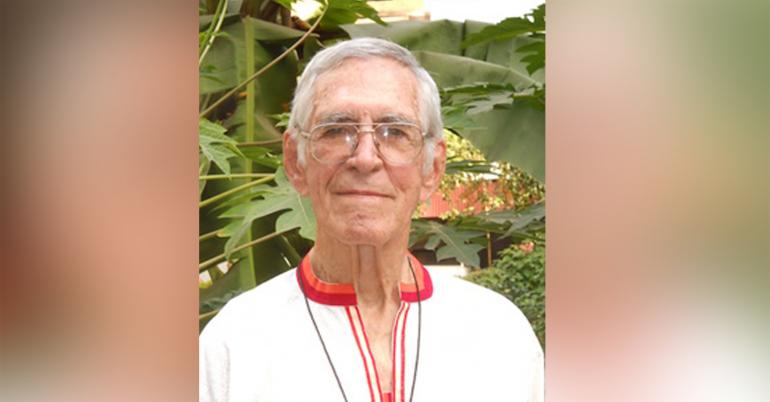Father Richard William Timm, Magsaysay awardee and missionary to Bangladesh, dies at 97

A Holy Cross missionary priest to Bangladesh who was awarded “Asia’s Nobel Prize” in 1987 died in the United States on Friday, Sept. 11, 2020.
Father Richard William Timm, CSC, passed away at the Holy Cross House in the University of Notre Dame campus in Indiana.
He was 97 years old.
Father Timm was a legend in Bangladesh. He was an internationally renowned zoologist who discovered at least 250 nematodes, a group of worms that make up the phylum Nematoda.
He was also an educator, a development worker, an author of books, and a friend of Bangladesh.
The priest was awarded the Ramon Magsaysay Award, dubbed as Asia’s Nobel Prize, in 1987 for International Understanding.
In response to his activities for development, Father Timm was honored with the citizenship from three different governments.
When he arrived in Bangladesh in 1952 from theological studies and graduate specialization in biology and parasitology, he established a science department at St. Gregory’s College in Dhaka (then East Pakistan) to introduce Bangladeshi students to the biological sciences while simultaneously engaged in research.
When the cyclone and massive tidal surge of November 1970 devastated the coast of Bengal, Father Timm mobilized relief and for the first time encountered brutal communal conflicts and rural power struggles.
Initiating and coordinating relief funded by foreign charities, the priest demonstrated a concern for all in need, regardless of creed or ethnic origin.
The Ramon Magsaysay Awards Board of Trustees recognized Father Timm for “his 35 years of sustained commitment of mind and heart to helping Bangladeshis build their national life.”
The priest was born in Michigan City, Indiana, on March 2, 1923.
His father, Joseph, was paymaster at the Pullman Company, the manufacturer of railway cars; his mother, Josephine Otten, was a housewife. Both were devout Roman Catholics, and Father Timm recalled that he and his three siblings — an older brother and two younger sisters — “were raised with a strong sense of duty, including fidelity to our religion and its practices.”
The future priest served the local church as an altar boy, and attended St. Mary’s Grade School and then St. Mary’s High School, where he was taught by Holy Cross Sisters.
His first awareness of missionaries came when he was just four. Having tagged along to St. Mary’s with his brother he met Sister Cleophas — who gave him a silver-framed picture of St. Therese, patroness of the missions. Sister Cleophas later became his first grade teacher and inspired his love and devotion.
For Father Timm the missionary vocation — rather than parish — always matched his personal inclinations.
From earliest years he loved adventure; indeed his first memory is of being lost in the city at age three.
In subsequent years he remembered his father gathering his sons into a great armchair and reading them stirring yarns of physical heroism and moral valor in exotic places.
Among such tales were Winnetou the Apache Chief by Karl May, in which a white man became blood brother to an American Indian.
Although in childhood games the Indians “were the bad guys,” from stories such as these Father Timm imbibed an “impression of the brotherhood between all peoples.”
He was ordained a priest on June 8, 1949.
After completing all his studies including his doctorate degree from Catholic University in Washington, he went to Dhaka in November 1952 and joined the newly established Notre Dame College.
He opened the Science department at the college and the Debating Club for which he is called Father of the Debating Club, which aims to help students digest their knowledge through debates.
He was given a special award for taking part in the Liberation War of Bangladesh.
For his involvement in various development projects, Father Timm was dubbed the “Father of NGOs in Bangladesh.”
In 1974, after starting the Justice and Peace Commission, he served as the executive secretary for 23 years.
He also initiated the Association of Development Agencies in Bangladesh, the Coordinator Council for Human Rights in Bangladesh and South Asia Forum for Human Rights. - Nikhil Gomes/RVA News
Radio Veritas Asia (RVA), a media platform of the Catholic Church, aims to share Christ. RVA started in 1969 as a continental Catholic radio station to serve Asian countries in their respective local language, thus earning the tag “the Voice of Asian Christianity.” Responding to the emerging context, RVA embraced media platforms to connect with the global Asian audience via its 21 language websites and various social media platforms.
















- Reply
Permalink